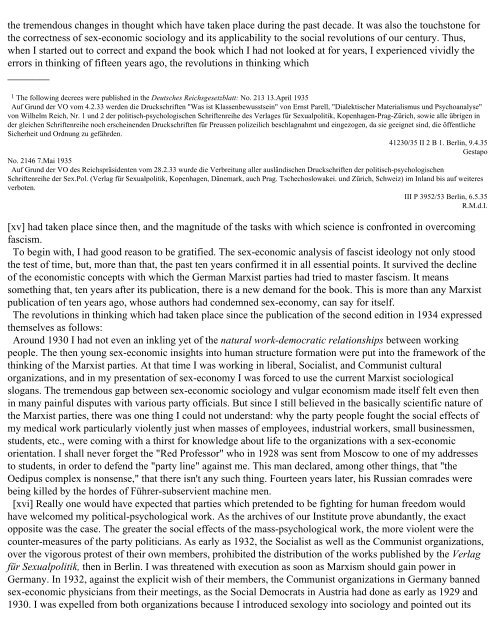The Mass Psychology of Fascism - Anxiety Depression Self-Help
The Mass Psychology of Fascism - Anxiety Depression Self-Help
The Mass Psychology of Fascism - Anxiety Depression Self-Help
You also want an ePaper? Increase the reach of your titles
YUMPU automatically turns print PDFs into web optimized ePapers that Google loves.
the tremendous changes in thought which have taken place during the past decade. It was also the touchstone for<br />
the correctness <strong>of</strong> sex-economic sociology and its applicability to the social revolutions <strong>of</strong> our century. Thus,<br />
when I started out to correct and expand the book which I had not looked at for years, I experienced vividly the<br />
errors in thinking <strong>of</strong> fifteen years ago, the revolutions in thinking which<br />
________<br />
1 <strong>The</strong> following decrees were published in the Deutsches Reichsgesetzblatt: No. 213 13.April 1935<br />
Auf Grund der VO vom 4.2.33 werden die Druckschriften "Was ist Klassenbewusstsein" von Ernst Parell, "Dialektischer Materialismus und Psychoanalyse"<br />
von Wilhelm Reich, Nr. 1 und 2 der politisch-psychologischen Schriftenreihe des Verlages für Sexualpolitik, Kopenhagen-Prag-Zürich, sowie alle übrigen in<br />
der gleichen Schriftenreihe noch erscheinenden Druckschriften für Preussen polizeilich beschlagnahmt und eingezogen, da sie geeignet sind, die öffentliche<br />
Sicherheit und Ordnung zu gefährden.<br />
41230/35 II 2 B 1. Berlin, 9.4.35<br />
Gestapo<br />
No. 2146 7.Mai 1935<br />
Auf Grund der VO des Reichspräsidenten vom 28.2.33 wurde die Verbreitung aller ausländischen Druckschriften der politisch-psychologischen<br />
Schriftenreihe der Sex.Pol. (Verlag für Sexualpolitik, Kopenhagen, Dänemark, auch Prag. Tschechoslowakei. und Zürich, Schweiz) im Inland bis auf weiteres<br />
verboten.<br />
III P 3952/53 Berlin, 6.5.35<br />
R.M.d.I.<br />
[xv] had taken place since then, and the magnitude <strong>of</strong> the tasks with which science is confronted in overcoming<br />
fascism.<br />
To begin with, I had good reason to be gratified. <strong>The</strong> sex-economic analysis <strong>of</strong> fascist ideology not only stood<br />
the test <strong>of</strong> time, but, more than that, the past ten years confirmed it in all essential points. It survived the decline<br />
<strong>of</strong> the economistic concepts with which the German Marxist parties had tried to master fascism. It means<br />
something that, ten years after its publication, there is a new demand for the book. This is more than any Marxist<br />
publication <strong>of</strong> ten years ago, whose authors had condemned sex-economy, can say for itself.<br />
<strong>The</strong> revolutions in thinking which had taken place since the publication <strong>of</strong> the second edition in 1934 expressed<br />
themselves as follows:<br />
Around 1930 I had not even an inkling yet <strong>of</strong> the natural work-democratic relationships between working<br />
people. <strong>The</strong> then young sex-economic insights into human structure formation were put into the framework <strong>of</strong> the<br />
thinking <strong>of</strong> the Marxist parties. At that time I was working in liberal, Socialist, and Communist cultural<br />
organizations, and in my presentation <strong>of</strong> sex-economy I was forced to use the current Marxist sociological<br />
slogans. <strong>The</strong> tremendous gap between sex-economic sociology and vulgar economism made itself felt even then<br />
in many painful disputes with various party <strong>of</strong>ficials. But since I still believed in the basically scientific nature <strong>of</strong><br />
the Marxist parties, there was one thing I could not understand: why the party people fought the social effects <strong>of</strong><br />
my medical work particularly violently just when masses <strong>of</strong> employees, industrial workers, small businessmen,<br />
students, etc., were coming with a thirst for knowledge about life to the organizations with a sex-economic<br />
orientation. I shall never forget the "Red Pr<strong>of</strong>essor" who in 1928 was sent from Moscow to one <strong>of</strong> my addresses<br />
to students, in order to defend the "party line" against me. This man declared, among other things, that "the<br />
Oedipus complex is nonsense," that there isn't any such thing. Fourteen years later, his Russian comrades were<br />
being killed by the hordes <strong>of</strong> Führer-subservient machine men.<br />
[xvi] Really one would have expected that parties which pretended to be fighting for human freedom would<br />
have welcomed my political-psychological work. As the archives <strong>of</strong> our Institute prove abundantly, the exact<br />
opposite was the case. <strong>The</strong> greater the social effects <strong>of</strong> the mass-psychological work, the more violent were the<br />
counter-measures <strong>of</strong> the party politicians. As early as 1932, the Socialist as well as the Communist organizations,<br />
over the vigorous protest <strong>of</strong> their own members, prohibited the distribution <strong>of</strong> the works published by the Verlag<br />
für Sexualpolitik, then in Berlin. I was threatened with execution as soon as Marxism should gain power in<br />
Germany. In 1932, against the explicit wish <strong>of</strong> their members, the Communist organizations in Germany banned<br />
sex-economic physicians from their meetings, as the Social Democrats in Austria had done as early as 1929 and<br />
1930. I was expelled from both organizations because I introduced sexology into sociology and pointed out its


